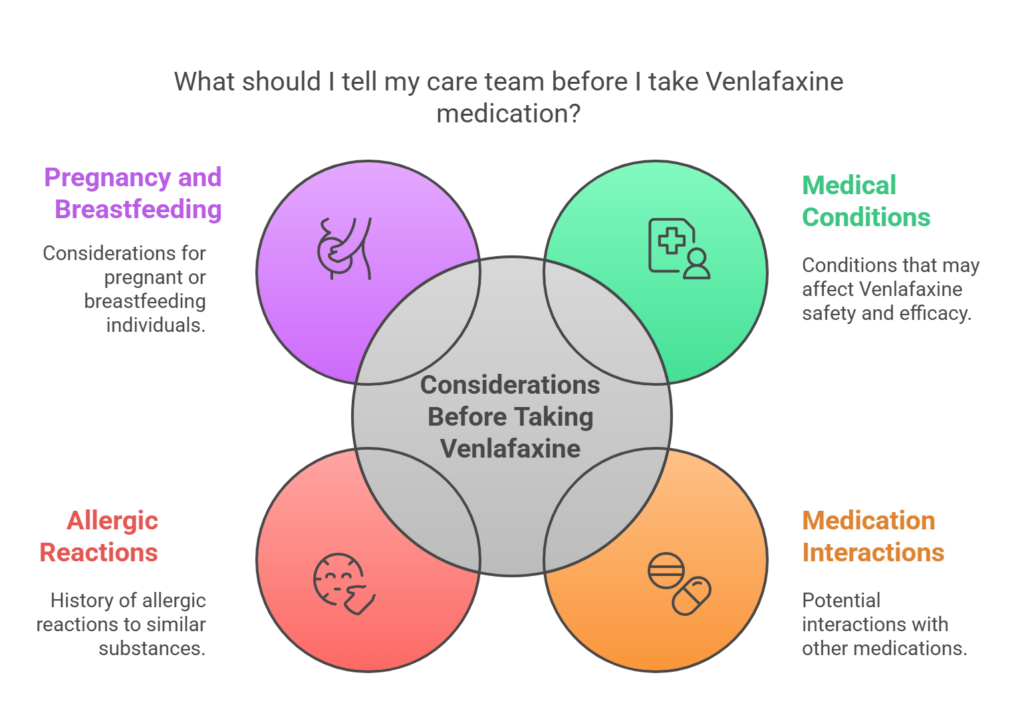Venlafaxine for anxiety, also known as Effexor, is widely used to treat various disorders. In fact, data shows that over 30% of adults in the United States experience an anxiety disorder at some point in their lives, and Venlafaxine is among the treatments.
These disorders can disrupt daily life, making it hard to handle routine tasks like work, school, and personal relationships. Dr. Ed Ratush, in the HealingUS podcast, highlights how anxiety has become a common issue for many people today. He discusses how doctors like him use mindfulness, technology, and strong patient relationships to help manage and treat anxiety effectively. Dr. Ratush also talks about new developments in anxiety treatment in the U.S. and the personal commitment needed for healing.
If you or your loved ones are suffering from anxiety, read this guide to make a good move. This article discusses venlafaxine for anxiety. It highlights potential side effects and substances to avoid while taking Venlafaxine.
What is Venlafaxine?
Venlafaxine (Effexor) is an antidepressant in the Serotonin-Norepinephrine Reuptake Inhibitor (SNRI) class. It helps boost serotonin and norepinephrine levels in the brain, which improves mood and mental balance.
Venlafaxine is officially used to treat major depressive disorder, generalized anxiety disorder, panic disorder, and social anxiety disorder. It also helps ease symptoms of:
Effexor is FDA-approved for treating anxiety and depression. Mild side effects like headaches and drowsiness may occur, but these usually fade as the body adjusts to the medication.
To treat anxiety, medication is not the only solution; diet, lifestyle, environment, and many other aspects play a crucial role. Studies show that no medication can fully cure anxiety. Even though venlafaxine cannot wholly cure anxiety, it can reduce anxiety symptoms. It is FDA-approved for treating anxiety disorders by adjusting the levels of serotonin and norepinephrine in the brain. This helps improve mood and provides relief from anxiety.
Venlafaxine can be used for:
By boosting these brain chemicals, venlafaxine helps people manage anxiety better and feel more balanced.

Venlafaxine for anxiety can be taken daily with food, either in the morning or evening. It’s important to stick to the prescribed dosage to avoid health issues from missed doses or overdoses.
Forms of venlafaxine include:
Dosages of venlafaxine (Effexor) vary based on
A standard starting dose is 37.5 mg to 75 mg daily. Doctors may start with a lower dose to see how it works. If there’s no improvement, they can increase it to 225 mg daily.
It takes time for venlafaxine to work. Most antidepressants can take up to six weeks to relieve anxiety. Venlafaxine usually takes four to six weeks for full effects, but some people may feel better within the first one or two weeks.
Like many medications, venlafaxine for anxiety (Effexor) can cause side effects. Most people experience only mild side effects, especially in the first week of treatment.
Common side effects of venlafaxine (Effexor):
Serious side effects of venlafaxine (Effexor) that may require immediate attention:
Your doctor can start you on a low dose that increases gradually to help minimize these side effects.
Taking certain medications, herbs, or supplements with venlafaxine (Effexor) can change how it works or increase the risk of serious side effects. Don’t start, stop, or change any medications without your doctor’s approval.
Venlafaxine can interact with various substances, leading to worsened side effects and health complications. Key interactions include:
Always check with your doctor about potential risks when using Venlafaxine for anxiety.
FAQs: Venlafaxine for Anxiety
A: Venlafaxine usually takes 4 to 6 weeks to work fully, but you might start feeling better in 1 to 2 weeks. Common side effects like nausea, headaches, sweating, and dry mouth usually fade after a few weeks.
A: Venlafaxine is called a “happy pill” because it increases serotonin and noradrenaline, chemicals that improve mood.
A: Stopping venlafaxine suddenly can cause withdrawal symptoms like irritability, nausea, dizziness, and headaches. Missing doses may also cause a return of your symptoms.
A: Yes, venlafaxine (Effexor XR) is approved to treat panic disorder.
A: Venlafaxine may work faster than SSRIs, and some people’s remission rates are better by the second week of treatment.
If you’re dealing with anxiety or the effects of venlafaxine, don’t worry! Relevance Recovery has experts available 24/7 to check your symptoms and see if Effexor is right for you.
Start with our free assessment to quickly determine if treatment is a good choice. If so, we’ll connect you with a clinician who can prescribe medication. We’re proud to be a leading provider in New Jersey, helping you on your path to better mental health!